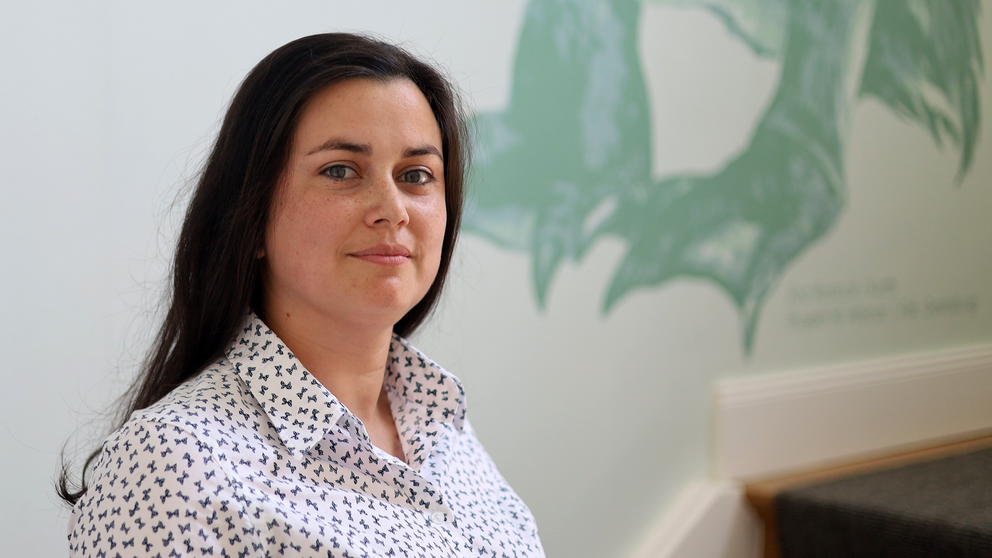
It doesn’t take much for Lianet De la Cruz Toranzo to enter the n-dimensional space in which the hypercomplex Clifford numbers are located. “Peace and quiet, paper and a pencil – basically that’s all I need for my work,” says the Humboldtian and former lecturer in functional analysis at the University of Holguín. “And my brain, of course, and occasionally some specialist literature.”
She is conducting research into these multidimensional spheres as a visiting scientist at the Institute for Applied Analysis in the Faculty of Mathematics and Computer Science at TU Bergakademie Freiberg. Her host is Professor Swanhild Bernstein. “The hypercomplex numbers I work with are not visible in the usual sense. But they adhere to rules and are constructed in a way that lets us analyse them and elaborate other theories. The so-called quaternions are used in quantum physics, for example,” says De la Cruz Toranzo. Her current goal is what is known as the polymonogenic Hardy decomposition of higher-order Lipschitz functions in the context of Clifford analysis, a branch of higher mathematics.
Best of all, we must ensure girls in primary school get excited about STEM subjects and explain to them that they can pursue an academic career in these areas.
Female models for greater diversity
An important signpost for her research: “Is there a symmetry, a pattern in what I’m doing?” was the question she was repeatedly asked by her long-term mentor, the mathematics professor, Ricardo Abreu Blaya, who is currently working at the Universidad Autonoma De Guerrero in Mexico. He was an important source of inspiration on her path into science. “During a visit to our pre-university class at secondary school he spoke about the mathematics of planetary movement. I found that very inspiring and decided to study maths.” But her fundamental interest had been awoken much earlier. “In Year 9 I had a private tutor who gave me a lot of homework. She encouraged us to think for ourselves and find solutions. This was quite different from our normal lessons at school and sparked my enthusiasm for mathematics.”
Seeking role models
Particularly in STEM subjects De la Cruz Toranzo thinks female role models are crucial. Although according to official statistics some 53 percent of all researchers in Cuba are women, a closer look reveals that physics and mathematics, in particular, are male-dominated fields. Just as in Germany, the classic role models are firmly rooted in society. It starts in childhood: “As a kid I wasn’t allowed to learn to ride a bike, for example, my brother was. And to this day, people still believe maths are not for girls and women,” she says. Her career as a researcher and professor proves the opposite. “In Cuba time has stood still in some ways. I myself only heard the word “feminist” for the first time in 2018 – on my first trip abroad during a research trip to Spain. Someone I knew went on an International Women’s Day demo. And I started reading more about feminism and patriarchy,” De la Cruz recalls. Now, she is in no doubt: “Best of all, we must ensure girls in primary school get excited about STEM subjects and explain to them that they can pursue an academic career in these areas.”
The visibility of female researchers is the key to a diverse, equitable science world. If something isn’t named or demonstrated, it doesn’t exist in society’s perception. That has to change.
Recently, the Cuban virologist, María Guadalupe Guzmán Tirado, became the first woman from the Caribbean to win the L’Oréal-UNESCO International Award for women in science for her research on Dengue fever. “I am almost sure that this piece of news is not being discussed in Cuban schools,” says De la Cruz Toranzo. She believes visibility is the key to a diverse, equitable science world because “if something isn’t named or demonstrated, it doesn’t exist in society’s perception. That has to change.”
New impetus through international exchange
The Cuban mathematician hopes her research stay in Freiberg will generate new ideas. “TU Freiberg is one of the few universities in Germany that has excellent mathematicians in Clifford analysis. The research institutions here are also better than most Cuban universities. The offices are well equipped, and we have free access to scientific journals through our institute.”
I come from a developing country where international mobility is difficult to achieve. That’s why I treasure every opportunity to internationalise, because it drives my research and facilitates its dissemination. As a Humboldt Fellow I also benefit greatly from networking with fellows from other research fields.
According to the information on countries published by the German Academic Exchange Service (DAAD), whilst in some cases Cuban universities provide outstanding theoretical training, due to the continuing economic crisis research requiring equipment and materials is very restricted. Moreover, for travel abroad scientists still need a special permit. “I come from a developing country where international mobility is difficult to achieve. That’s why I treasure every opportunity to internationalise, because it drives my research and its dissemination. As a Humboldt Fellow I also benefit greatly from networking with fellows from other research fields,” says De la Cruz Toranzo.
She has been able to extend her Humboldt Research Fellowship by a further year. Following a hacker attack, TU Bergakademie Freiberg was offline for three months. “That threw my timetable right off track. I am all the more grateful that I can now stay longer to continue my research.” Apart from her research work, she now plans to spend the time until the end of 2024 improving her skills in German and cycling. “In Freiberg I have managed to practise cycling regularly. When the weather’s good, I now even go on short tours at the weekend.”
Author: Esther Sambale
